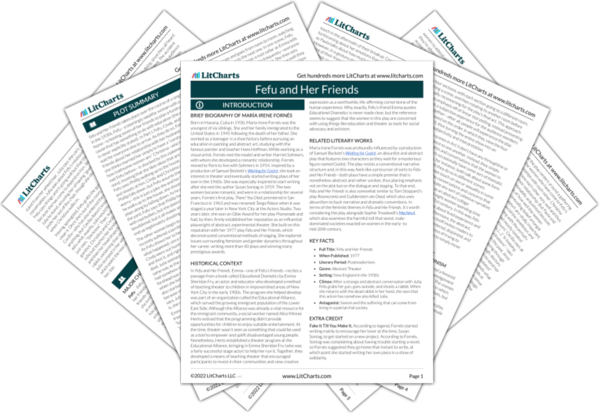The characters in Fefu and Her Friends often talk about their romantic relationships, ultimately exploring the tensions and complexities of being romantically involved with another person. Paula and Cecilia are particularly good examples of people who struggle to understand their own romantic feelings, since they used to be lovers. Now, though, they’re trying to find a way to be in each other’s lives in the aftermath of their affair—a task that is especially difficult because of an apparent lack of resolution in their previous romantic relationship. As Paula tries to express how much Cecilia meant to her (and still means to her), she ends up making things awkward between them. And though she clarifies that she’s not trying to get back together with Cecilia, it’s clear that she doesn’t want to lose Cecilia altogether—in other words, she wants Cecilia’s companionship. Similarly, Fefu’s relationship with her husband, Phillip, is quite fraught and flawed, but she can’t bring herself to conceive of a world in which she’s not with him. She tells her friends that Phillip is dismissive and even scornful of her, but she still feels like she needs him, suggesting that she has come to depend on the companionship they’ve established together. Of course, the play doesn’t imply that this attitude is healthy or rewarding for Fefu, but it does underscore the power that close romantic relationships can sometimes have over people. Human beings, the play seems to argue, are naturally inclined to develop romantic bonds; and, more importantly, when love and attraction fade away, a strong sense of connection often remains.
Attraction, Romance, and Companionship ThemeTracker

Attraction, Romance, and Companionship Quotes in Fefu and Her Friends
FEFU: There you have it! You too are fascinated with revulsion.
CHRISTINA: Hmm.
FEFU: You see, that which is exposed to the exterior . . . is smooth and dry and clean. That which is not . . . underneath, is slimy and filled with fungus and crawling with worms. It is another life that is parallel to the one we manifest. It’s there. The way worms are underneath the stone. If you don’t recognize it . . . (Whispering.) it eats you. That is my opinion.

Unlock explanations and citation info for this and every other Fefu and Her Friends quote.
Plus so much more...
Get LitCharts A+FEFU: That’s all right. I scare myself too, sometimes. But there’s nothing wrong with being scared . . . it makes you stronger.—It does me.—He won’t put real bullets in the guns.—It suits our relationship . . . the game, I mean. If I didn’t shoot him with blanks, I might shoot him for real. Do you see the sense of it?
JULIA: He loves you.
FEFU: He can’t stand me.
JULIA: He loves you.
FEFU: He’s left me. His body is here but the rest is gone. I exhaust him. I torment him and I torment myself. I need him, Julia.
JULIA: I know you do.
FEFU: I need his touch. I need his kiss. I need the person he is. I can’t give him up. […]











